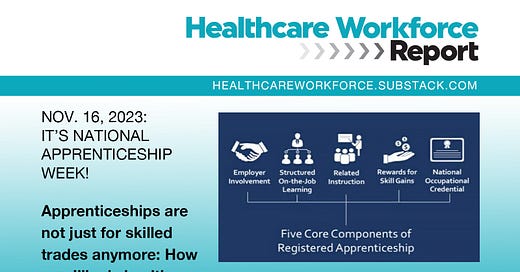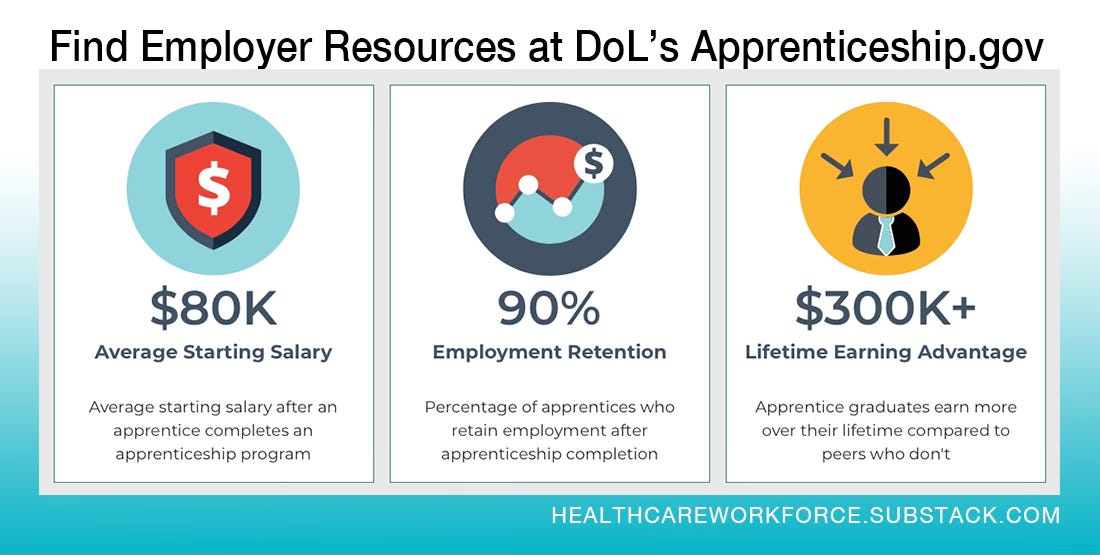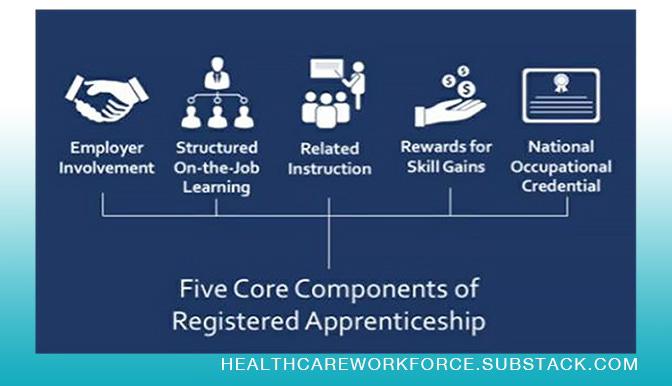Apprenticeships are proving valuable to employers in an unusual place: Healthcare
Illinois health network FHN is on Year 3 of its Registered Apprenticeship program for Medical Assistants and Pharmacy Techs. It's working so well, FHN is expanding the program to other roles.
Happy National Apprenticeship Week (Nov. 13–19)! You might be thinking “wait a minute, I thought this was a healthcare-related Substack.”
It is! And you’re right: Apprenticeships are not typically associated with the healthcare sector — or with any sector outside of skilled trades, for that matter.
We know that healthcare’s SOP for recruiting new people into the field is no longer an effective solution. With the cost of a four-year degree going up and college enrollments going down, healthcare employers that previously could recruit from a handful of higher ed partners now must partner with dozens of academic institutions to recruit students into the field, particularly for frontline HC jobs considered “entry-level” — i.e., roles don’t require a four-year degree much less a medical degree, but they do require some specialized training and in most cases a “certification.” Familiar examples include Medical Assistant and Pharmacy Tech.
The Nov. 10 edition of Healthcare Workforce Report spotlights a new nationally available program to start equipping would-be healthcare professionals in high school. (You can read about the high school healthcare CTE program in the Central Penn Business Journal and at THEJournal.com.)
But what about the two-thirds of American adults who are already out of high school and don’t hold a college degree? How can healthcare recruiters tap into that demographic to help meet critical workforce shortages?
Registered Apprenticeships. A handful of states are on the leading edge of encouraging healthcare employers to institute Registered Apprenticeship programs, including Washington with its Healthcare Apprenticeship Consortium, the KansasWorks Office of Registered Apprenticeship, and Colorado’s Healthcare Apprenticeship program. And the U.S. Department of Labor has stepped up investments in apprenticeships, expanding online resources for employers at Apprenticeship.gov.
But in other states with no official program yet in place, some innovative healthcare organizations are building new systems for workforce needs using the apprenticeship model.
FHN, an Illinois healthcare network with 18 locations serving over a half-million patients a year, began experimenting with the apprenticeship model for recruiting and training new career-starters in 2020, working with a nearby community college. The following year, FHN partnered with online training and credentialing platform MedCerts, which specializes in healthcare and IT programs for learners of all ages.
Healthcare apprenticeships at FHN: How it started
“The increasingly critical staffing shortages of the past several years have driven those of us in healthcare to find innovative ways to replace lost workers and find new ones,” says Len Carter, Chief Human Resources Officer at FHN.
When Carter and his team began planning their apprenticeship experiment, not everyone was initially enthusiastic, he told me.
“There were those who argued ‘but we need people now,’ and we would say, ‘yes, but we will have this exact same problem in nine months, and in nine years, if we don’t try something new like apprenticeships to expand our talent pool.”
Some who voiced concerns argued that current Medical Assistants had to complete an entire associate’s degree program, and the standards should not be lowered. Carter explained that the standards are not lowered at all; the advances in education technology in recent years simply allow trainees to complete their classroom training online and at a faster pace.
“Most healthcare professionals simply don't understand the apprenticeship model,” Carter said. “If you don't look at what private industry has done with apprenticeships, then you won't understand how to use them in healthcare. As healthcare leaders learn more about the model and understand how it can fill especially those entry-level roles, the benefits of this model for healthcare organizations become clear.”
Working with the regional workforce development board, FHN built a healthcare apprenticeship model that would “grow their own” workforce and build a future workforce pipeline, focusing first on two jobs: Medical Assistant and Pharmacy Tech.
FHN partnered with MedCerts for the online “classroom” training and prep for the industry credential exam; it worked with its regional workforce development board to tap into grant funds from the Department of Labor’s Registered Apprenticeship Program, which has received over $200M in new funding the past two years as it focuses on growing apprenticeships in sectors with critical labor shortages. DoL lists eight healthcare occupations as “apprenticeable.”
For the hands-on portion of the program, FHN provides mentors and on-site clinical education at its various locations.
How it’s going
FHN’s apprenticeship program — which typically takes about nine months from start to certification — has been so successful that the organization is developing apprenticeship programs for other needs, Carter said. “It is a model every healthcare employer should consider in this challenging workforce environment.”
The first class to participate in the apprenticeship program via MedCerts’ online training has completed their training, earned their credentials, and are working in those roles at FHN now. The organization’s career pathways map is being expanded to include apprenticeships in a number of areas where demand far outnumbers the number of available workers.
Carter said the model has been a resounding success for FHN because it not only removes barriers for new career-starters who can’t attend college, it also reduces academic recruiting demands and serves as a vetting process for permanent hires.
“During that nine months of apprenticeship, we are observing, seeing how they're doing, and helping them along the way — they're getting the education, so they're not just working,” Carter said. “So we know if they're going to succeed in our culture, we know their work ethic, and we see what they’ve learned firsthand. This lets us grow our own talent, and the individuals we have do not need previous healthcare experience — they just need the right aptitude and work ethic.”
Shout-out to Healthcare Workforce Report sponsors
The Healthcare Workforce Report newsletter is generously supported by MedCerts.
For information on supporting HWR, email HealthcareWorkforce@substack.com.







